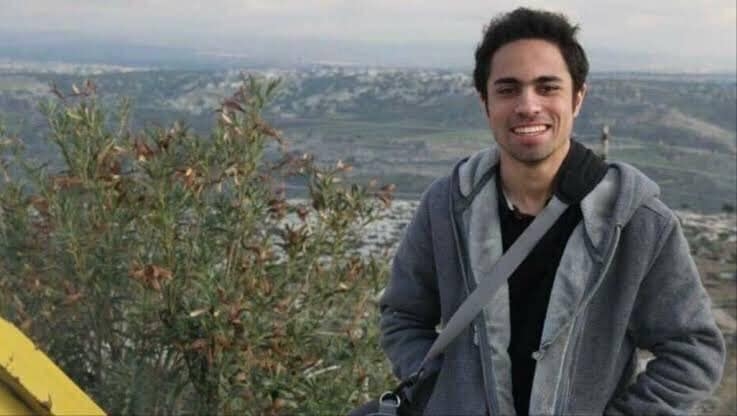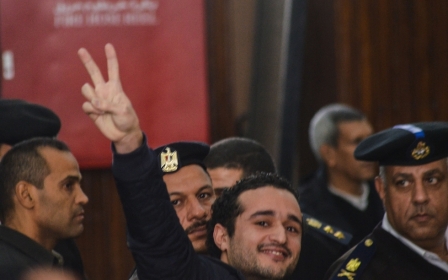Unable to see him before he died, jailed Egyptian satirist attends father’s funeral

Footage of an Egyptian satirist embracing the coffin of his deceased father has gone viral after authorities accepted his lawyer's request to release him from prison to attend the funeral on Sunday.
Shadi Abu Zaid, 25, has been held in pre-trial detention since May on charges of "joining a terrorist group" and "spreading false news".
His provisional detention was renewed for 45 days on 25 December.
Co-defendants in Abu Zaid’s case include liberal activist Shadi al-Ghazali Harb, Amal Fathi, April 6 Movement spokesperson Sherif el-Rubey, and blogger Mohamed Ibrahim.
After the footage of Abu Zaid embracing the coffin went viral, commentators made references to President Abdel Fattah el-Sisi’s claim to CBS news last week that Egypt has “no political prisoners”.
According to journalist Hadeel al-Mahdawi who attended the funeral, Abu Zaid was allowed few minutes during the funeral to bid farewell to his father, then two hours at his family’s home, and was later taken back to custody.
The prosecution had rejected several requests by Abu Zaid’s lawyers to release him to visit his father while he was sick, according to his lawyer Mokhtar Monir.
Abu Zaid rose to fame in Egypt after a viral satirical video in which he inflated condoms and handed them to police officers as balloons in Tahrir Square on the sixth anniversary of the 2011 revolution.
He produced a satirical YouTube show called “The Rich Content”, which featured comic interviews with Egyptians on current affairs. In one of his videos, he mocked censorship in Egypt by making a fake interview with a censorship official. Most responses by the guest are bleeped.
Abu Zaid also worked as a correspondent for the satirical puppet show Abla Fahita, which was cancelled in 2016 over its use of sexual innuendo and political commentary in many episodes, watched by millions.
'No political prisoners in Egypt'
Abu Zaid’s moving footage drew condemnation from rights activists who called for his release.
Sisi has led a relentless crackdown against both Islamist and secular pro-democracy activists since the coup he led against his predecessor Mohamed Morsi in July 2013.
International rights groups have estimated that there are at least 60,000 political prisoners in Egyptian jails since Sisi became president in 2014.
Sisi won a second term in April last year, running virtually unchallenged in presidential elections after all candidates - except one, who publicly supported him - were arrested or discredited.
Sisi’s second and last term in office ends in 2022, but an Egyptian court is currently reviewing a lawsuit demanding constitutional amendments that would extend his term.
The lawsuit was opposed by more than a thousand Egyptian public figures and politicians, who dismissed it as an attempt to perpetuate the 64-year-old’s rule.
New MEE newsletter: Jerusalem Dispatch
Sign up to get the latest insights and analysis on Israel-Palestine, alongside Turkey Unpacked and other MEE newsletters
Middle East Eye delivers independent and unrivalled coverage and analysis of the Middle East, North Africa and beyond. To learn more about republishing this content and the associated fees, please fill out this form. More about MEE can be found here.




